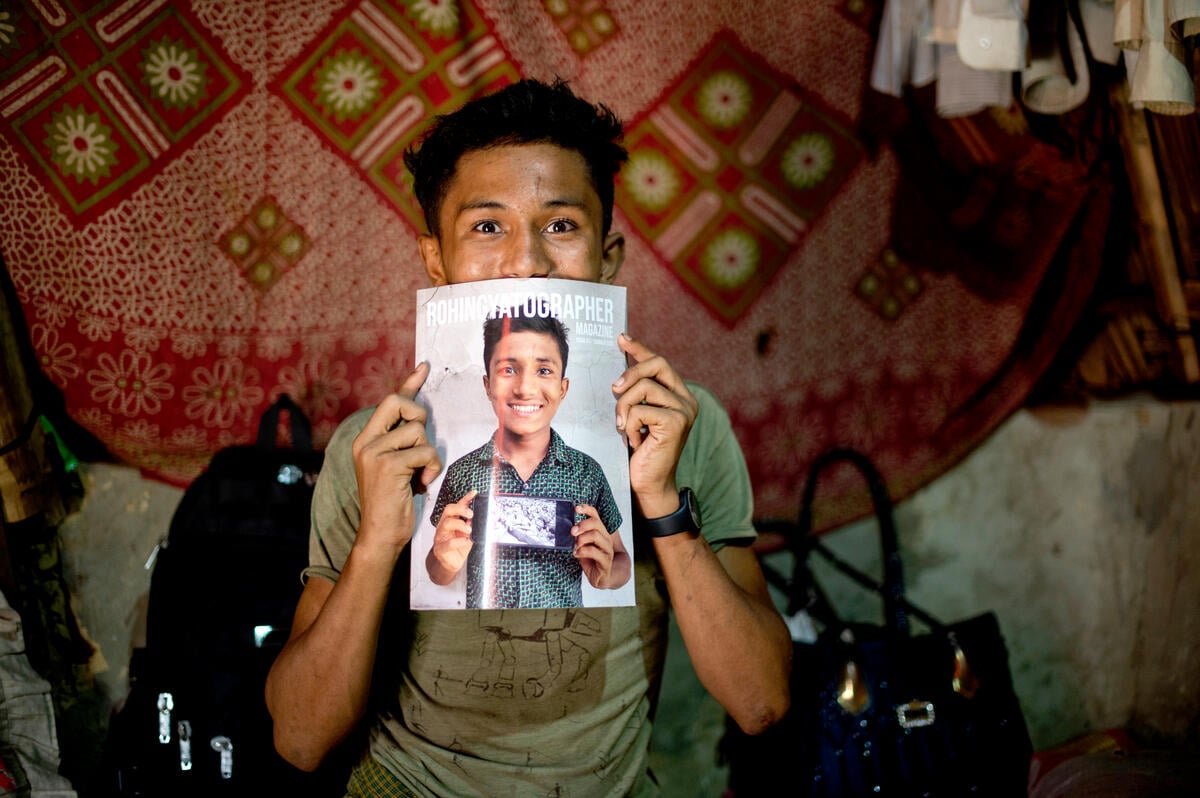In Nepal, a refugee changemaker drives forward the inclusion of refugees with disabilities

In Nepal, a refugee changemaker drives forward the inclusion of refugees with disabilities
Standing inside the bamboo hut in the Beldangi refugee camp in Jhapa, eastern Nepal, Devi Maya Gurung smiles as a group of older refugees with disabilities from Bhutan busy themselves with making traditional stools using bamboo sticks, colourful nylon threads and used bicycle tires.
The stools, popularly known as “Mudaa” in Nepali language, fetch around NPR 300 to NPR 550 (equivalent to USD 2.6 to USD 5) per piece depending on their quality. They are in high demand, providing a steady income for the community’s refugees with disabilities.
These livelihoods projects, offered by the Lutheran World Federation (LWF) and supported by UNHCR, the UN Refugee Agency, are now widely appreciated among the older refugee men and women in the community. However, this wasn’t originally the case.
“It was tough to convince them that it would lead to a better future. I worked hard to motivate them,” said Devi Maya, President of the Bhutanese Refugee Association of the Disabled (BRAD). Established in 2013, BRAD focuses on developing leadership among persons with disabilities as well as networking and advocating for them with the government and non-government agencies and other community-based organizations.
When the Start and Improve Your Business (SIYB) training was introduced in 2017 to help refugees to become self-reliant while promoting entrepreneurship and dignified livelihoods, many were reluctant to participate.
“When I stood for the training, many didn’t like me. Some even threatened me to leave the camp,” she recalled. “But I was determined. I used to say that if you have skills, your self-confidence will grow and once you have some income source, you don’t have to depend on others.”
Devi Maya considers engaging refugees with disabilities in livelihoods projects to be one of the biggest successes of her life. Thanks to her, refugee women and men with disabilities also work in mushroom farming, pickle making, doll making and handicraft production.
“The same people who used to scold me now thank me for bringing opportunity for them. They say, ‘we are sorry about the past,’” said Devi Maya, who fled Bhutan and arrived in Nepal at the age of 20 in 1992. She was still a student in Grade 10 when she left her home.
In the early 1990s, over 100,000 refugees from Bhutan entered Nepal and were accommodated in seven camps in Jhapa and Morang districts. Following the resettlement of over 113,500 Bhutanese refugees to third countries, the remaining two Bhutanese refugee camps of Beldangi and Pathari Sanischare, with a population of 6,365, have now been transformed into self-sufficient, sustainable settlements.
When she arrived in Nepal, Devi Maya couldn’t continue her studies due to her family’s lack of finances. During her initial days in the refugee camp, she stayed alone inside her family’s hut and never talked to other people.
“I was disabled. On top of that, I cursed myself for being a refugee,” she recalled. As time passed, Devi Maya felt that rather than spending time complaining about life, she should try to find solutions.
With support from her family, Devi Maya was soon able to break people’s stereotypes of what a person with disabilities could and couldn’t do. A few months after her arrival, she became a volunteer teacher for an adult literacy programme for refugees. Later, she worked as a primary school teacher at a childcare centre.
When she joined BRAD, there were few opportunities for persons with disabilities to participate in and contribute to life in the camps. Gradually, Devi Maya started working on empowering them and mitigating the social stigma towards persons with disabilities within families and the wider camp community.
She also started receiving training on SGBV, psycho-social issues and self-defence. The trainings boosted her confidence and increased her knowledge on how to handle disability and gender-based violence issues.
Today, in her current role with BRAD, Devi Maya trains refugees on SGBV sensitization, prevention and response. She also coordinates with other community-based organizations working on SGBV and child protection, as well as with local government authorities on the protection issues facing vulnerable persons.
“During early days, refugees with disabilities faced domestic and sexual violence. They were neglected by their own family members, so you can imagine how hard it would be for them in a community,” said the mother of two.
“If you continue to do hard work, you get dividends in different forms. It is not just about earning money.”
Because of her active approach and her dedication to serving the community, BRAD has become an established name among local authorities and partner agencies. Recently, she also had the opportunity to participate in the High Commissioner’s Dialogue on Protection, organized by UNHCR. She described it as one of the best moments of her life.
“If you continue to do hard work, you get dividends in different forms. It is not just about earning money,” the 48-year-old explained. “It makes you happy when you are acknowledged. It feels so good that I have been able to contribute something to the community.”
In her community, she is leaving no stones unturned in her campaign for increased opportunities for refugees with disabilities, as well as their inclusion in community programmes. During the COVID-19 pandemic, this has been more important than ever.
Under her leadership, BRAD has been conducting activities to ensure that refugees with disabilities are not forgotten in the response to COVID-19. This has included advocating and coordinating with the camp management committees and agencies for disability-friendly spaces, repairing huts of persons with disabilities, and coordinating with medical officers to prioritize persons with disabilities in the hospitals.
“COVID-19 has shown us how important it is to work together and to be a part of an inclusive society,” she said.












